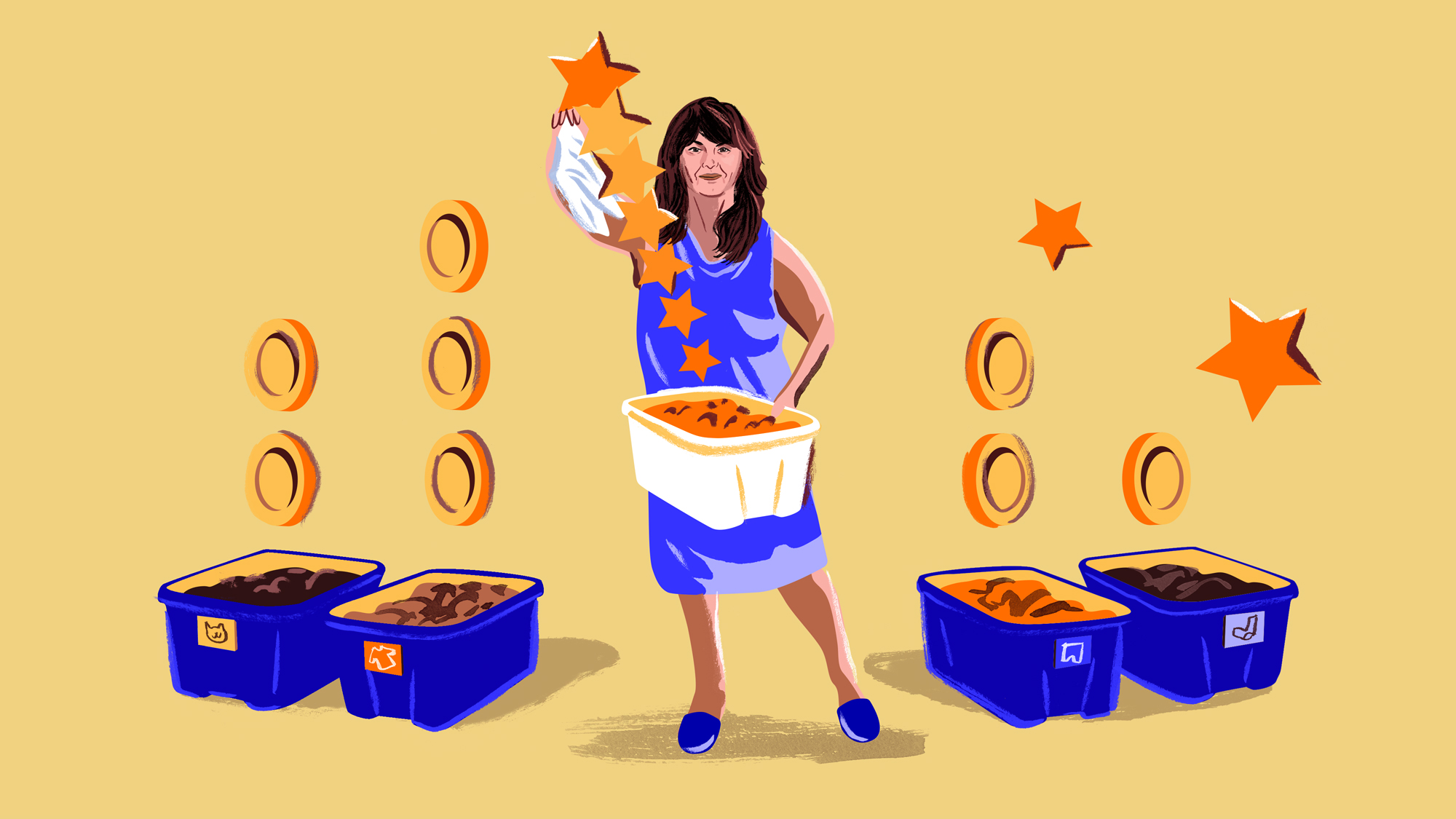KC DAVIS is famous for leaving dishes unwashed, forgetting to sweep, and, perhaps most of all, never folding laundry. But many of her 1.5 million TikTok followers credit her with helping them keep their homes cleaner than ever. Through her experience living with ADHD and her training as a licensed therapist, Davis has learned that a functional space isn’t always a tidy one. Her unique approach to what a well-kept dwelling should look like has helped followers, patients, and Davis herself radically reimagine how and why they clean.
Davis first started posting TikTok videos about parenting and housekeeping as a way to socialize during COVID-19 lockdowns. She’d just moved and had a second child on the way, and the added stressors of 2020 brought her lifelong dislike of cleaning tasks to a head. A pile of unwashed dishes didn’t used to be an ordeal, but now it meant scrubbing baby bottles while her children wailed for breakfast. “I’d always been messy, but my space had always been functional,” Davis says. Suddenly, the way she’d always managed chores just didn’t cut it.
Davis noticed that many cleaning influencers celebrated sparkling floors and crumbless cabinets as inherently superior, while putting the onus on people with messier homes to stop being lazy and brute-force new habits to achieve the same perfection. It reminded her of a hard lesson she’d learned treating—and recovering from—substance use disorder: Focusing on total sobriety can keep someone from making progress at all. Davis, who spent 18 months in rehab as a teen, thinks the world of housekeeping should take cues from harm reduction—an approach usually associated with interventions like safe injection sites, which are intended to mitigate the risks of drug use for individuals who can’t or won’t abstain. In a similar way, she tries to show compassion to anyone (including herself) who can’t, realistically, do what might seem to be best for them, even when it comes to regular tasks at home.
Davis knew from experience that entirely revamping her morning routine wasn’t going to rid her of her dread of doing the dishes. She also knew that she didn’t care about the optics of a pile of crusty plates. So she focused on figuring out how to have clean dinnerware on hand. She eventually placed a rack for soiled dishes near the sink, which cleared the faucet for washing an item or two as needed.
By taking an all-or-nothing approach to tidiness, she explains, we set ourselves up to fail—and forget what the comforts of home are really about. For people dealing with disabilities, mental illness, or financial stress, Davis says, aspiring to complete domestic chores “properly” can mean not making the unglamorous changes that will help manage symptoms and responsibilities. Instead of focusing on turning a “dirty” room “clean,” she urges viewers to cut tasks down into individual, manageable steps that can markedly improve their lives.
“You’re a person who deserves to have their suffering alleviated,” she says. “You’re a person who deserves to have help raising your quality of life based on the skills you possess today.”
Davis generally encourages her viewers to play around with strategies that feel right for them—but she has a few widely applicable hacks to evangelize. One of her most universal, which went viral in September 2020, is her “five things” method. It boils down to the wisdom that every mess, no matter how intimidating, can be split into five buckets: trash, laundry, dishes, stuff that has a place, and stuff that needs one. Davis finds that dealing with one category at a time helps with her executive dysfunction—a common ADHD symptom that makes processes involving many decisions difficult. While cleaning, Davis used to get waylaid flitting from room to room, which slowed her progress. Tackling a few smaller messes is less overwhelming. “For my brain, at least, it becomes like I’m in a video game hunting down loot,” she says.
The “five things” method also has five natural stopping points. If you bag your trash but then get tired or distracted, Davis explains, you’ve still made a real improvement to your space. Each step makes the room more usable, even if it doesn’t make it substantially prettier. Davis often reminds her viewers that there’s no shame in laboring less; following an order of operations that prioritizes hygiene and frequently used objects can accomplish much more than half-starting a deep cleaning routine over and over again.
That’s how she finally tackled the mountain of rumpled clothes that used to cover the laundry room floor. Instead of pressuring herself to neatly fold and organize garments in closets, Davis asked what was actually wrong with the messy pile. She realized she was spending a lot of time and effort fishing things out of the heap. So she started sorting freshly dried items into bins—one for each household member—in a shared “family closet,” and it made a huge difference.
“People say, ‘Oh, but stuff gets wrinkled.’ But it was already getting wrinkled on the floor,” she says, laughing. “I didn’t make anything worse!”
In her 2022 book, How to Keep House While Drowning, Davis recalls that some of her early TikTok commenters called her lazy. But many more have expressed relief at seeing a therapist present chores as things worth doing imperfectly, if that means the helpful parts still get done. As Davis fondly shares: “Anything worth doing is worth half-assing.”
Read more PopSci+ stories.

